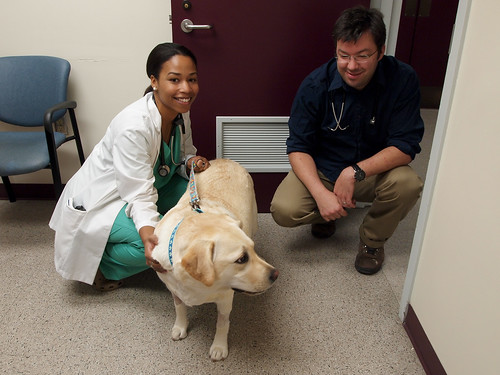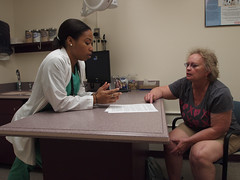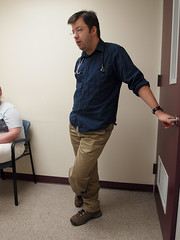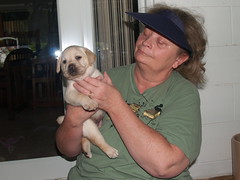Ruby Comes Home
We traveled up to Gainesville this past Saturday (3 July) to pick Ruby up from the Small Animal Hospital. She'd been there since Judy dropped her off Monday.
Although it was a Saturday, the day started off early and tense; we had to check Ruby out by 9:30am at the hospital, so I had to be on the road no later than 7:30am in Orlando. Which meant getting up around 6:45am, like a regular work day. What made it more complicated than a regular work day is that my wife and oldest daughter wanted to ride along as well. I could certainly understand that, as it was the two of them that delivered Ruby to Gainesville the prior Monday.
I drove the whole way non-stop. This was also a bit unusual, as Judy likes to stop at various rest areas on a road trip to get out and stretch. But nothing was said about stopping, although we certainly talked a bit on the way up just to keep me alert.
The trip up I-75 was quick and uneventful; no traffic accidents in Ocala as there are wont to be, especially on a holiday weekend. We left I-75 at the SW Archer Rd exit, and made good time to the Small Animal Hospital on SW 16th Ave. When we arrived and parked, we rang in at the front entrance and then waited for security to let us in. Saturday was not a regular working day (Monday through Friday is), but they still had a minimal staff on duty. It wasn't more than five minutes after announcing our arrival at the locked front door than we were in the waiting room to see Ruby.
We were met in the waiting room by Misha Dunlap, a University of Florida Veterinary School student. She'd been Ruby's little buddy almost from the start. It was Misha who called Judy at least one a day to give us all an update on how Ruby was doing. And it was Misha who had an important part in Ruby's recovery. While I absolutely believe in the power of veterinary medicine, Misha's love and attention to Ruby was just as important as her medical skills. I'm sure she had other patients to tend to in the hospital. I'm also quite certain Misha's boundless caring was more than enough to go around to everyone.
I want to take a moment to underscore how important it is to have such a good "bedside" manner. Misha's sensitivity to the concerns of Ruby's owners (us) as well as Ruby herself is every bit as vital as her knowledge of medicine, especially when an animal's very life hangs in the balance. Make no mistake; we didn't know what was wrong with Ruby or what really triggered the incident (and we still don't), but we expected to lose Ruby and were resigned to this fact up until mid-Thursday. I can't help but believe that Misha's excellent medical knowledge and positive personal interactions will make her a superb vet when she graduates.
Misha had help, in this case Dr. Andrew Specht, a full veterinary doctor. Although our time with Dr. Specht was brief, he never-the-less came across as easy going and caring. He took a lot of time patiently answering questions I had about Ruby's condition, what to feed her going forward, and what to expect once we got Ruby home. Dr. Specht reinforced my positive experiences with Misha while adding a dimension of polish and experience.
Misha and Dr. Specht spent a bit of time talking about Ruby. We never felt rushed, even though we knew they'd worked the night shift, and were needing to go home and sleep. When we left with Ruby, we left with a feeling that everything had been answered to our satisfaction and that we had more than enough information to continue to care for Ruby and help her finish her convalescence.
Why Gainesville?
The answer to this is multi-faceted. First and foremost, that this isn't the first time we've had to call on the services of the University of Florida Veterinary School. In 1986, just two years after Judy and I had married and moved to Orlando, her first yellow Lab Rhett was sick, almost deathly ill. He was listless, with poor appetite, and was showing blood in his urine. He'd been in that condition for months. Our vet at the time didn't seem to have a real clue as to what was going on, except to say Rhett had an infection. So he would prescribe one antibiotic after another, hopeful that he might get lucky. Judy was frustrated beyond words.
Judy's sister, who was alive at the time, and also a Lab breeder, suggested we take Rhett up to Gainesville. So Judy followed that advice. It should be noted that Judy did this 10 days after giving birth to our first child. We had her mother with us at the time and I was close to home, so the baby was covered. But Judy was desperate to find out what was wrong with Rhett, and so she made that first fateful trip to Gainesville, just her and Rhett.
It took Gainesville several days to diagnose the problem, which turned out to be some sort of proteus infection. Gainesville had an antibiotic flown up from Miami, which when administered to Rhett had it knocked out in no time. Rhett came back to normal in short order. Rhett was six at the time; he lived for another ten full years.
Ruby marks the second time we've gone to Gainesville. It was a series of serendipitous circumstances that led us to Gainesville. It was Dr. Prather, and his assistant Elizabeth that recognized what was really happening and gave Ruby her first bag of saline. He sent us on to the Veterinary Emergency Clinic were we met another excellent vet, Dr. Dietz. Dr. Dietz and the staff kept Ruby alive over the weekend until Monday. By then, Judy and I had already decided to drive Ruby up to Gainesville. The fact that Ruby is back home and on the road to recovery reinforces our belief that we made the right decision.
But It's More Complicated Than That
Ruby might be four-footed and fuzzy, but she's as much a member of the family as any of us. Ruby is special; she's Judy's first real dog since Rhett (the rest being more like full family dogs), in that we found a breeder and Judy picked Ruby (or, more to the point, Ruby picked Judy).
Ruby was important for another reason; she was a replacement for another beloved Lab we called Babe. Babe died Christmas 2007, a year that was already tumultuous and was leading into an even more fractious 2008. Even though Babe was 13 1/2 when she died, her death hit us pretty hard because we were not expecting it. In the past, when Rhett (and later his companion, Katy) died, they were "full of years". Rhett died when he was sixteen, and he was ready to go. But Babe was still full of energy (even at 13) and when she went, she went so fast it was a shock, especially at Christmas.
So there was a lot of emotional baggage tied to that little yellow Lab we named Ruby, perhaps too much. Add to that the fact she wasn't even two years old yet, and you had a situation where I wasn't going to give up on Ruby without a fight.
And finally, to top it all off, was the fact I was in some way responsible for putting her in the state she wound up in. I was the one who took them both out for walks that fateful morning, and it was right after the walk when Ruby became ill. Regardless of the fact that Max showed no illness whatsoever (and he's nearly ten years old); I. Was. Responsible.
I had a responsibility to Judy, and to her overall happiness. Ruby was part of that. And I had a responsibility to the girls; they had both become very involved with Ruby, in part because they knew how important Ruby was to their mom. And I had a responsibility to little Ruby, who was in the state she was in through no fault of her own.
And then there's the philosophical side of why I reacted to such a situation. I have spent nearly half my life living with and raising a family, which has included Labs. I have lived with the fundamental rule that I would always be there for my family, that I wouldn't leave anyone behind. And that attitude has been extended to the Labs we've kept through all those years as well. I'm well aware there are those who would have weighed Ruby's life against the money required to help her heal, and made the "pragmatic" decision to just let her die (or put her to sleep). If I had made that decision it would have called into question the strength of my convictions. It's one thing to not have the money, and I certainly understand that. But it's a callous decision to let a creature die because you place more value on material possessions (and money) over the life of another living creature, especially a life that hangs in the balance.
Equipment Used
Olympus E-P2, M.Zuiko 14-42mm 1:3.5-5.6
Although it was a Saturday, the day started off early and tense; we had to check Ruby out by 9:30am at the hospital, so I had to be on the road no later than 7:30am in Orlando. Which meant getting up around 6:45am, like a regular work day. What made it more complicated than a regular work day is that my wife and oldest daughter wanted to ride along as well. I could certainly understand that, as it was the two of them that delivered Ruby to Gainesville the prior Monday.
I drove the whole way non-stop. This was also a bit unusual, as Judy likes to stop at various rest areas on a road trip to get out and stretch. But nothing was said about stopping, although we certainly talked a bit on the way up just to keep me alert.
The trip up I-75 was quick and uneventful; no traffic accidents in Ocala as there are wont to be, especially on a holiday weekend. We left I-75 at the SW Archer Rd exit, and made good time to the Small Animal Hospital on SW 16th Ave. When we arrived and parked, we rang in at the front entrance and then waited for security to let us in. Saturday was not a regular working day (Monday through Friday is), but they still had a minimal staff on duty. It wasn't more than five minutes after announcing our arrival at the locked front door than we were in the waiting room to see Ruby.
We were met in the waiting room by Misha Dunlap, a University of Florida Veterinary School student. She'd been Ruby's little buddy almost from the start. It was Misha who called Judy at least one a day to give us all an update on how Ruby was doing. And it was Misha who had an important part in Ruby's recovery. While I absolutely believe in the power of veterinary medicine, Misha's love and attention to Ruby was just as important as her medical skills. I'm sure she had other patients to tend to in the hospital. I'm also quite certain Misha's boundless caring was more than enough to go around to everyone.
I want to take a moment to underscore how important it is to have such a good "bedside" manner. Misha's sensitivity to the concerns of Ruby's owners (us) as well as Ruby herself is every bit as vital as her knowledge of medicine, especially when an animal's very life hangs in the balance. Make no mistake; we didn't know what was wrong with Ruby or what really triggered the incident (and we still don't), but we expected to lose Ruby and were resigned to this fact up until mid-Thursday. I can't help but believe that Misha's excellent medical knowledge and positive personal interactions will make her a superb vet when she graduates.
Misha had help, in this case Dr. Andrew Specht, a full veterinary doctor. Although our time with Dr. Specht was brief, he never-the-less came across as easy going and caring. He took a lot of time patiently answering questions I had about Ruby's condition, what to feed her going forward, and what to expect once we got Ruby home. Dr. Specht reinforced my positive experiences with Misha while adding a dimension of polish and experience.
Misha and Dr. Specht spent a bit of time talking about Ruby. We never felt rushed, even though we knew they'd worked the night shift, and were needing to go home and sleep. When we left with Ruby, we left with a feeling that everything had been answered to our satisfaction and that we had more than enough information to continue to care for Ruby and help her finish her convalescence.
Why Gainesville?
The answer to this is multi-faceted. First and foremost, that this isn't the first time we've had to call on the services of the University of Florida Veterinary School. In 1986, just two years after Judy and I had married and moved to Orlando, her first yellow Lab Rhett was sick, almost deathly ill. He was listless, with poor appetite, and was showing blood in his urine. He'd been in that condition for months. Our vet at the time didn't seem to have a real clue as to what was going on, except to say Rhett had an infection. So he would prescribe one antibiotic after another, hopeful that he might get lucky. Judy was frustrated beyond words.
Judy's sister, who was alive at the time, and also a Lab breeder, suggested we take Rhett up to Gainesville. So Judy followed that advice. It should be noted that Judy did this 10 days after giving birth to our first child. We had her mother with us at the time and I was close to home, so the baby was covered. But Judy was desperate to find out what was wrong with Rhett, and so she made that first fateful trip to Gainesville, just her and Rhett.
It took Gainesville several days to diagnose the problem, which turned out to be some sort of proteus infection. Gainesville had an antibiotic flown up from Miami, which when administered to Rhett had it knocked out in no time. Rhett came back to normal in short order. Rhett was six at the time; he lived for another ten full years.
Ruby marks the second time we've gone to Gainesville. It was a series of serendipitous circumstances that led us to Gainesville. It was Dr. Prather, and his assistant Elizabeth that recognized what was really happening and gave Ruby her first bag of saline. He sent us on to the Veterinary Emergency Clinic were we met another excellent vet, Dr. Dietz. Dr. Dietz and the staff kept Ruby alive over the weekend until Monday. By then, Judy and I had already decided to drive Ruby up to Gainesville. The fact that Ruby is back home and on the road to recovery reinforces our belief that we made the right decision.
But It's More Complicated Than That
Ruby might be four-footed and fuzzy, but she's as much a member of the family as any of us. Ruby is special; she's Judy's first real dog since Rhett (the rest being more like full family dogs), in that we found a breeder and Judy picked Ruby (or, more to the point, Ruby picked Judy).
Ruby was important for another reason; she was a replacement for another beloved Lab we called Babe. Babe died Christmas 2007, a year that was already tumultuous and was leading into an even more fractious 2008. Even though Babe was 13 1/2 when she died, her death hit us pretty hard because we were not expecting it. In the past, when Rhett (and later his companion, Katy) died, they were "full of years". Rhett died when he was sixteen, and he was ready to go. But Babe was still full of energy (even at 13) and when she went, she went so fast it was a shock, especially at Christmas.
So there was a lot of emotional baggage tied to that little yellow Lab we named Ruby, perhaps too much. Add to that the fact she wasn't even two years old yet, and you had a situation where I wasn't going to give up on Ruby without a fight.
And finally, to top it all off, was the fact I was in some way responsible for putting her in the state she wound up in. I was the one who took them both out for walks that fateful morning, and it was right after the walk when Ruby became ill. Regardless of the fact that Max showed no illness whatsoever (and he's nearly ten years old); I. Was. Responsible.
I had a responsibility to Judy, and to her overall happiness. Ruby was part of that. And I had a responsibility to the girls; they had both become very involved with Ruby, in part because they knew how important Ruby was to their mom. And I had a responsibility to little Ruby, who was in the state she was in through no fault of her own.
And then there's the philosophical side of why I reacted to such a situation. I have spent nearly half my life living with and raising a family, which has included Labs. I have lived with the fundamental rule that I would always be there for my family, that I wouldn't leave anyone behind. And that attitude has been extended to the Labs we've kept through all those years as well. I'm well aware there are those who would have weighed Ruby's life against the money required to help her heal, and made the "pragmatic" decision to just let her die (or put her to sleep). If I had made that decision it would have called into question the strength of my convictions. It's one thing to not have the money, and I certainly understand that. But it's a callous decision to let a creature die because you place more value on material possessions (and money) over the life of another living creature, especially a life that hangs in the balance.
Equipment Used
Olympus E-P2, M.Zuiko 14-42mm 1:3.5-5.6





Comments
Post a Comment
All comments are checked. Comment SPAM will be blocked and deleted.